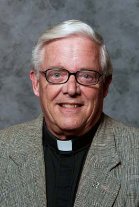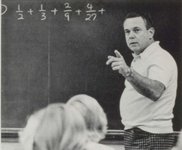Getting ready for college. Continue reading
I took my first and only science class, physics, in my senior year at Rockhurst High. The teacher was Fr. Borer, SJ. No one was ever more aptly named than he.1 This was the only class that I took at Rockhurst that really aggravated me.
The textbook was great, but the classes were nearly insufferable, at least for me. Maybe Fr. Borer sensed my attitude. He really seemed to have it in for me.
After only a few days of class he administered a test on the use of the slide rule. Almost everyone else in the class had taken chemistry the year before and was familiar with it. I did not do well on the test, but I got very high scores on the other tests. Nevertheless, I received my lowest grade of any subject any year in the first quarter.
Later we were assigned the task of writing an essay about a famous physicist. I picked Johannes Kepler, and I did quite a bit of research. My essay emphasized the motivation for Kepler’s work, which was primarily to emphasize (often incorrectly) the balance and orderliness of the universe. I got a bad grade. Fr. Borer criticized my “purple prose.” What really upset me was the fact that I was certain that some students got A’s for copying encyclopedia entries verbatim.
I mastered the subject matter without any problem, but my final grades did not represent my standing among the other students in this regard. They were dragged down by the slide rule test in the first semester, and the essay in the second. It was probably a case of “sour grapes”, but I avoided the sciences for the rest of my (very long) academic career. It also made me wary of writing papers. In my undergraduate years I avoided them like the plague.
The senior Latin class was taught by Fr. Puricelli. The subject this time was Virgil’s Aeneid. The only specific thing that I remember about this class was Fr. Purch’s insistence that Dido had blonde hair. Carthage at that time was founded by refugees from Tyre, a Lebanese city. Lebanon is not exactly famous for producing Aryan types, but what do I know?
Fr. Purch also insisted that of all musical instruments the violin sounded the most like the human voice. As usual he supplied no evidence or reasoning.
I took two Advanced Placement classes, English and calculus. These represented a new set of offerings for Rockhurst. Our class was one of the first, if not the very first, to participate in the AP program.
The English class was much better than the first three that I took. Mr. Cummings, SJ,2 was a good teacher, and we read a lot of really good books. The two that I remember the most clearly are The Brothers Karamazov (in English) and Absalom, Absalom.
I argued with Mr. Cummings about his interpretation of Ivan’s role in Dostoevsky’s novel. His position depended upon one word in a very lengthy novel, but I could not refute it. I always wondered what the actual Russian word was. I could have looked it up when I took Russian the next year at Michigan, but I never did. Now I don’t even remember the issue.
 My other vivid memory was when a photographer came to our class to take a posed photo of our class for the yearbook. I held my book as if I were reading it,but I deliberately had it upside down. Nobody on the yearbook staff noticed, and the photo was published.
My other vivid memory was when a photographer came to our class to take a posed photo of our class for the yearbook. I held my book as if I were reading it,but I deliberately had it upside down. Nobody on the yearbook staff noticed, and the photo was published.
Yes, it might have been a sin, but certainly only a venial sin, and I have amassed plenty of indulgences over the years. If you need a primer on indulgences, you can find one here.
I remember one specific writing tip that Mr. Cummings offered. If you have an adverbial clause and a main clause, he recommended putting the adverbial clause first. I followed his advice in the last sentence.
In the calculus class I at first had a very difficult time with the chain rule. I did poorly on the test that we had on this concept. Disconsolate, I went to Mr. Murdock3 for advice on what to do about it. I had never dropped in on a teacher, but I was in a real bind because I had already taken the alternative math class, probability. I did not know what to do.
Mr. Murdock did not help much, but the very next day John Immele was asked to show on the blackboard his solution to a chain rule problem. He used Leibniz notation (dy/dx) to express the derivative of y with respect to x as opposed to xDy, which Mr. Murdock used. The chain rule, expressed in Leibniz notation is dy/dx=dy/du x du/dx, which looks just like the rule for multiplying fractions. A light bulb lit in my head, and all of a sudden I could easily do chain rule problems.
Mr. Murdock ran a Kwiki car wash during the summer. He famously wore a banlon shirt every day, and seldom or never wore a jacket or coat.
Late in the year we took the Advanced Placement tests. I passed both of them. My recollection is that most but not all of my classmates also passed.
 We took lots of tests. I was disappointed with my scores on the National Merit Scholarship Test and the ACT tests. However, I did quite well on the SATs: 714 on the English part and 752 on the math. A few guys did better on one or the other, but I don’t think anyone outscored me on both. I also did quite well on the proficiency tests: 790 in Latin, 800 in math level 1, and 756 in the writing sample.
We took lots of tests. I was disappointed with my scores on the National Merit Scholarship Test and the ACT tests. However, I did quite well on the SATs: 714 on the English part and 752 on the math. A few guys did better on one or the other, but I don’t think anyone outscored me on both. I also did quite well on the proficiency tests: 790 in Latin, 800 in math level 1, and 756 in the writing sample.
I applied to four schools: St. Louis University, Marquette, Iowa, and Michigan. Marquette and SLU are Jesuit universities; the other two are, of course, public. It is hard to believe, but I some how received an acceptance letter from SLU only two days later. The other three acceptance letters came within a few weeks.
I was accepted into the honors programs at all the schools except U-M.
My parents probably would have preferred that I attend a Catholic school, but I thought that twelve years of religious education was enough. Iowa and Michigan had the two most prestigious actuarial programs in the country, and I had convinced myself that I wanted to be an actuary.
Actually, I wanted to study classical languages, but a conversation with Mr. Rothermich changed my mind. He told me that if I majored in the classics, I could teach Latin somewhere, but the degree was useless for any other job.
My dad had said that he would foot the bill for college. I might have been able to get a scholarship somewhere, but he would not provide a statement of income, and all the applications required it. So, I felt obligated to get a degree that would likely be useful in starting a career.
For graduation We had to rent formal wear with white coats, but the ceremony was not a big deal for me. My mother probably took some photos, but I cannot remember ever seeing them. I think that I finished fourth in the class on cumulative GPA.
One medal was awarded to each student in each subject every year. I never won one. I was somewhat disappointed that I did not win the Greek medal for senior year. I was the only guy who got a perfect score on the final exam, but Fr. Burton awarded the medal to John Rubin.
My Uncle Dean expressed the opinion that Rockhurst emphasized academics too much at the ceremony. He thought that more emphasis should have been put on athletics. His son Terry had lettered in basketball.
1. Fr. Gerald Borer died in 2007. His obituary is here. He evidently did no teaching for at least the last thirty-four years of his life.
 2. Fr. Thomas Cummings, SJ, celebrated his fiftieth anniversary in the priesthood in 2019. After serving as chair of the English department for six years, he spent many years in the administration of various Jesuit educational institutions. He was president of Saint Louis University High School from 1977-1985 and president of Rockhurst High School from 1992-1993.
2. Fr. Thomas Cummings, SJ, celebrated his fiftieth anniversary in the priesthood in 2019. After serving as chair of the English department for six years, he spent many years in the administration of various Jesuit educational institutions. He was president of Saint Louis University High School from 1977-1985 and president of Rockhurst High School from 1992-1993.
3. Marc Murdock died in 2012. His obituary is here.




